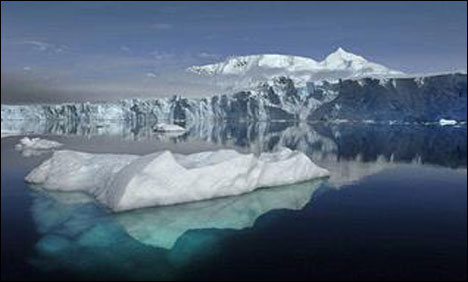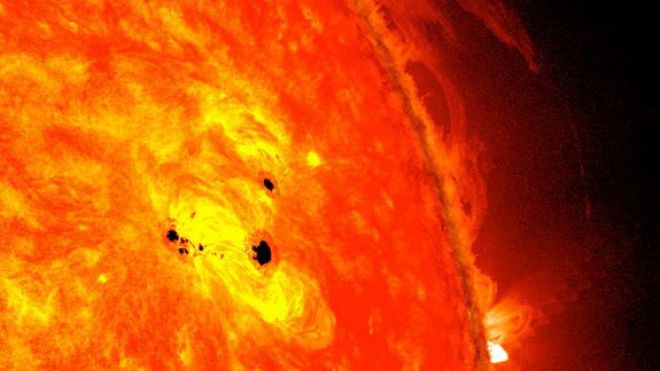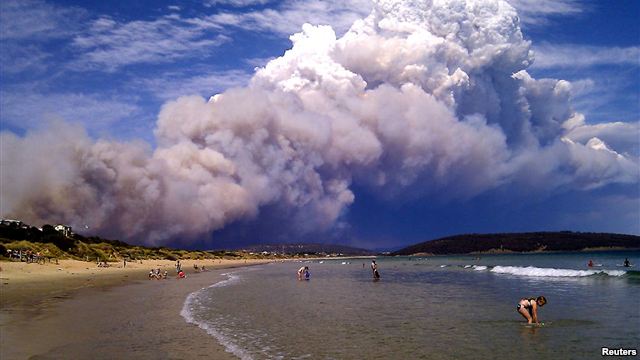- Web
- Humsa
- Videos
- Forum
- Q2A



A new form of microbial life has been found in water samples taken from a giant freshwater lake hidden under kilometers of Antarctic ice, Russian scientists said Monday.
Sergei Bulat and Valery Lukin said in a statement that the ``unidentified and unclassified'' bacterium has no relation to any of the existing bacterial types. They acknowledged, however, that extensive research of the microbe that was sealed under the ice for millions of years will be necessary to prove the find and determine the bacterium's characteristics.
New samples of water retrieved from Lake Vostok earlier this year are expected to be delivered to St. Petersburg in May aboard a Russian ship.The Russian team reached the surface of the subglacial lake in February 2012 after more than two decades of drilling, a major achievement hailed by scientists around the world.
They touched the lake water Sunday at a depth of 12,366 feet (3,769 meters), about 800 miles (1,300 kilometers) east of the South Pole in the central part of the continent.
Scientists hope the lake might allow a glimpse into microbial life forms that existed before the Ice Age and could have survived in the dark depths of the lake, despite its high pressure and constant cold _ conditions similar to those which also are believed to be found under the ice crust on Mars, Jupiter's moon Europa and Saturn's moon Enceladus.
At 250 kilometers (160 miles) long and 50 kilometers (30 miles) wide, Lake Vostok is similar in size to Lake Ontario. It is kept from freezing into a solid block by the kilometers (miles)-thick crust of ice across it that acts like a blanket, keeping in heat generated by geothermal energy underneath.
Some have voiced concern that the more than 60 tons of lubricants and antifreeze used in the drilling may contaminate the lake, but the Russian researchers have insisted that their technology is environmentally secure. They said water from the lake rushed up the borehole once the drill touched the surface and froze, safely sealing the lubricants from the lake's pristine waters.
Bulat and Lukin said the research team has done a meticulous analysis of the samples to differentiate bacteria contained in lubricants from what they hoped could be a trace of new life forms. Initial studies only spotted bacteria associated with the lubricants, but scientists said they eventually found one bacterium that didn't fall into any of the known categories.
The researchers said that the small size of the initial sample and its heavy contamination made it difficult to conduct more extensive research. They voiced hope that the new samples of clean frozen water that are to arrive in St. Petersburg this spring will make it possible to ``confirm the find and, perhaps, discover new previously unknown forms of microbial life.''
A US team that recently touched the surface of Lake Whillans, a shallower subglacial body of water west of the South Pole, also found microbes. The scientists are yet to determine what forms of bacteria they found.
 The sun is surprisingly quiet at the moment, but that may be because our star is gearing up for the second phase of a one-two wallop in its 11-year activity cycle, some scientists say.
The sun has slumped to its present lull from a very fiery 2011, seeming to contradict a widely predicted 2013 peak in solar flares, sunspots and other activity for the curr..... Read more
The sun is surprisingly quiet at the moment, but that may be because our star is gearing up for the second phase of a one-two wallop in its 11-year activity cycle, some scientists say.
The sun has slumped to its present lull from a very fiery 2011, seeming to contradict a widely predicted 2013 peak in solar flares, sunspots and other activity for the curr..... Read more
 A filing Wednesday in a high-stakes legal battle between Samsung and Apple revealed that a "pinch-to-zoom" patent central to the case has been deemed invalid.
The patent was a centerpiece of a trial that ended in August with a jury ordering Samsung to pay Apple $1.05 billion in damages for illegally copying iPhone and iPad features f..... Read more
A filing Wednesday in a high-stakes legal battle between Samsung and Apple revealed that a "pinch-to-zoom" patent central to the case has been deemed invalid.
The patent was a centerpiece of a trial that ended in August with a jury ordering Samsung to pay Apple $1.05 billion in damages for illegally copying iPhone and iPad features f..... Read more
 The United Nations' chief science body is meeting in Tasmania as climate scientists urge Australia to prepare for rising sea levels that could put about $300 billion worth of commercial property, infrastructure and homes at risk. The U.N. Intergovernmental Panel on Climate Change summit in Hobart is the latest round of talks before the release of its ..... Read more
The United Nations' chief science body is meeting in Tasmania as climate scientists urge Australia to prepare for rising sea levels that could put about $300 billion worth of commercial property, infrastructure and homes at risk. The U.N. Intergovernmental Panel on Climate Change summit in Hobart is the latest round of talks before the release of its ..... Read more












 Clean Chit (Faisal Raza Abidi ...
Clean Chit (Faisal Raza Abidi ...  Akhir Kiyon - 16th December 2...
Akhir Kiyon - 16th December 2...  To The Point - 16th December ...
To The Point - 16th December ...  Capital Talk â
Capital Talk â  Kal Tak - 16th December 2013
Kal Tak - 16th December 2013  Bay Laag - 16th December 2013
Bay Laag - 16th December 2013  Kharra Sach - 16th December 2...
Kharra Sach - 16th December 2...  Awaam - 15th December 2013
Awaam - 15th December 2013 





 Gold Miner
Gold Miner  Superbike GP
Superbike GP  Whipsaw Fighter
Whipsaw Fighter  PacMan
PacMan 


